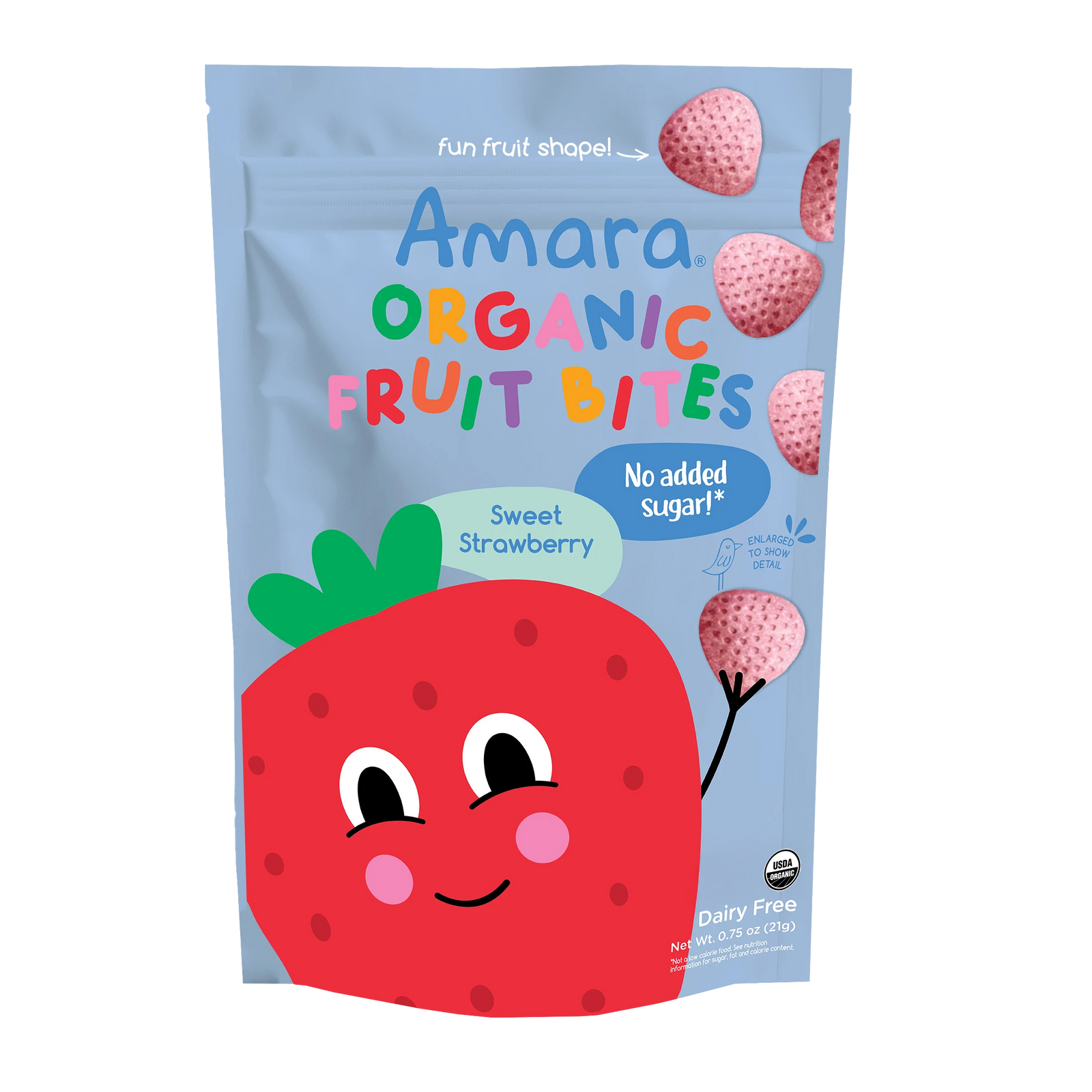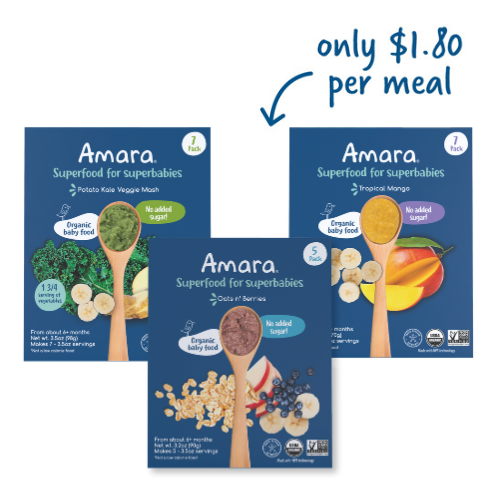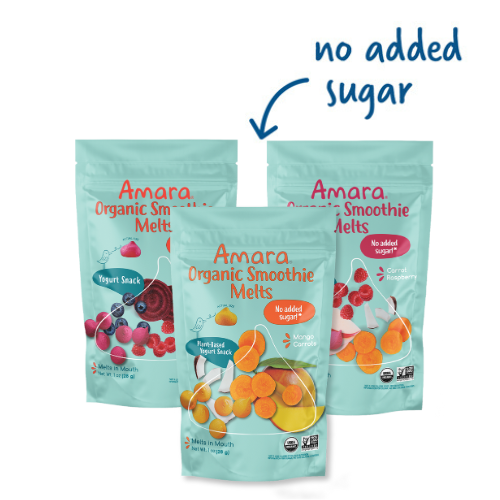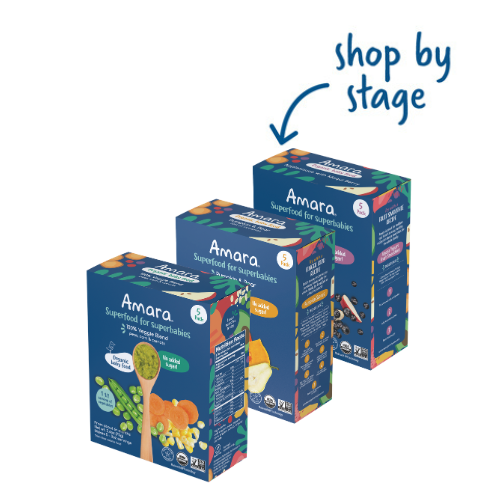TIPS AND TRICKS IN INTRODUCING SOLID FOODS FOR YOUR BABY
What does introducing solid foods mean?
This is the start of nutrient containing foods or liquids other than breast milk for your baby. It refers to the period of time that your baby will start to wean off of breast milk and formula until they start participating in the family meals.
When your baby has its first foods and starts solids, it’s a really exciting step and here at Amara, we are excited to help you and your baby with this adventure.
When to start solid foods?
In the first months of life, infants should be exclusively breastfed or fed formula and normally do not require liquids like water, tea, juices, sweetened beverages or other energy providing liquid. There are some possible exceptions in certain conditions such as diarrhea, very high temperatures, high fever or in some special circumstances which should be clarified with your pediatrician.
Complementary feeding or the introduction to solid foods should be started when the nutritional needs of your baby are not covered through breast milk or formula anymore. For the majority of healthy term infants, a sufficient volume of breast milk or formula should be able to supply the nutrient needs of the infant until about 6 months of age. Others suggest at least 4 months of age. Anytime the energy and protein demand of the infant continues to increase, especially in breastfed infants, the amounts of micronutrients like iron, vitamin D (especially if the infant get very little sunlight), vitamin B6 or zinc may need to be supplied.
At 6 months, most babies will reach a general and neurological stage of development (chewing, swallowing, digestion and excretion) where they can also be fed by other foods rather than breast milk or formula alone.
Possible consequences of early or late introduction of solid foods for your baby
Different studies have associated very early introduction of complementary foods with an increased risk of allergies. On the other hand, late introduction of complementary food also may be disadvantageous if infant growth stops or slows down. There, the risk of malnutrition and micronutrient deficiency increases and it may trigger unwanted feeding behavior later on.
Introduction to solids should begin after 6 months of exclusive breastfeeding according to the WHO and not before 17 weeks and not after 26 weeks (after 4 months and not later than 6 months of age) according to the European Society for Pediatric Gastroenterology Hepatology and Nutrition (ESPGHAN).
Remember though, that every baby is different, always consult with your pediatrician and be watching and listening your baby to see when he/she is ready for solids.
What about beverages/ liquids for my baby?
Giving babies “energy providing liquids” for example: tea with sugar or juices) may displace breast milk or infant formula intake and thereby may adversely affect nutrient supply. In other words, if a baby is drinking juices, they may be drinking less breast milk as a result.
Furthermore, a regular intake of energy providing liquids might risk getting babies used to their sweet taste with a possible increased risk for later development of dental caries and obesity. And, a high and regular intake of fruit juices may exceed the intestine´s ability to absorb carbohydrates and favor risk of poor absorption. Basically, we recommend staying away from any juices, tea or sugary drinks with your baby.
What kind of solids should be introduced for your baby?
Fruits on general are liked very much from infants due to their sweet und acid taste. Their texture, aroma, flavor in most cases fresh and ripe, cooked, mashed or grated finely are appropriate to be served at early age. Fruits are a valuable resource for vitamin (A,C), minerals (K), fiber and bioactive compounds.
Vegetables with their wide variation of colors, taste, texture are strongly appreciated in the baby food world. Rich in vitamins, minerals, fiber, bioactive compounds enriches the meals from baby to elderly through the whole life. Vegetables should be a regular part of your baby’s daily intake. First vegetables can be butternut squash, sweet potato, broccoli, carrots, peas, pumpkin, zucchini, etc.
Meat, fish, poultry: enriches the baby food with protein, vitamins (B12) and minerals (iron, zinc) among others. Their regular intake in corresponding amounts can be a valuable natural iron source for your baby. They contain heme-iron, that is most easily absorbed and used by our bodies. Important is that the meat is fully cooked before served.
Cereal is a good resource of carbohydrates, fiber, vitamins, minerals and bioactive compounds. Babies should receive only cooked/precooked cereal. Typical for the USA are fortified infant cereals, appreciated as first solid introduced as baby food.
Fatas butter or oils should be a regular ingredient in the baby food. The requirement of fat intake in babies is much higher than in adults. Preferably butter or oil (suitable for babies like from raps, olive, soy) are recommended.
Experience matters.
Remember that your baby’s preferences come from experience. The sweet taste, like from fruit, babies usually enjoy from the beginning and do not take much convincing for your baby to like. Savory on the other hand, like the taste of vegetables or other foods may be a bit more bitter tasting to your baby and may be more difficult to introduce. But babies need repetition, It can take 3 to 6 or more times for your baby to learn to like a new flavor.
My baby doesn’t like vegetables what can I do?
If your baby doesn’t like vegetables the first time, don’t worry. Take a pause and try again after a few days or weeks. If you are having a hard time introducing new flavors, remember that flavors can also come through your breast milk. Research has shown that if a mom eats a certain vegetable/food, the baby can learn to recognize that flavor and is more likely to eat that flavor later on.
Introducing your baby to solid foods is a journey, it will take several tries before your baby likes all the new flavors. The importance is to slowly start to introduce your baby to a large variety of fruits, vegetables, whole cereals, legumes and meat or fish.
If you can’t make homemade baby food, the best option is using Amara as our technique minimally alters the taste, textures and nutrients of the original fruits and vegetables. This makes it easier for the babies to recognize what real fruits and vegetables taste like (not masked by sugary pouches) and helps them develop a disposition to whole, healthy ingredient choices as they grow older.
Introducing your baby to solid foods is a journey, it will take several tries before your baby likes all the new flavors. The importance is to slowly start to introduce your baby to a large variety of fruits, vegetables, whole grains, legumes and protein. Amara Organic Foods offers an introduction to solids that includes both fruits, vegetables and root vegetables to kick start your baby’s first step to solid foods.
References:
Dewey 2007 : Nutrition, growth, and complementary feeding of the breastfed infants. Text book of Human Lactation. 2017
Gupta et al Timing of food introduction and atopy prevention. Clin Dermatol 2017
Nicklaus S Complementary feeding strategies to facilitate acceptance of fruits and vegetables: a narrative review of the literature. Int J Environ Res Public Health 2016
Reilly an Wells, Duration of exclusively breastfeeding introduction of complementary feedng may be necessary before 6 months of age2005).
Schiess et al Intake of energy providing liquids during the first year of life in five European countries. Clin Nutr 2010








Leave A Comment